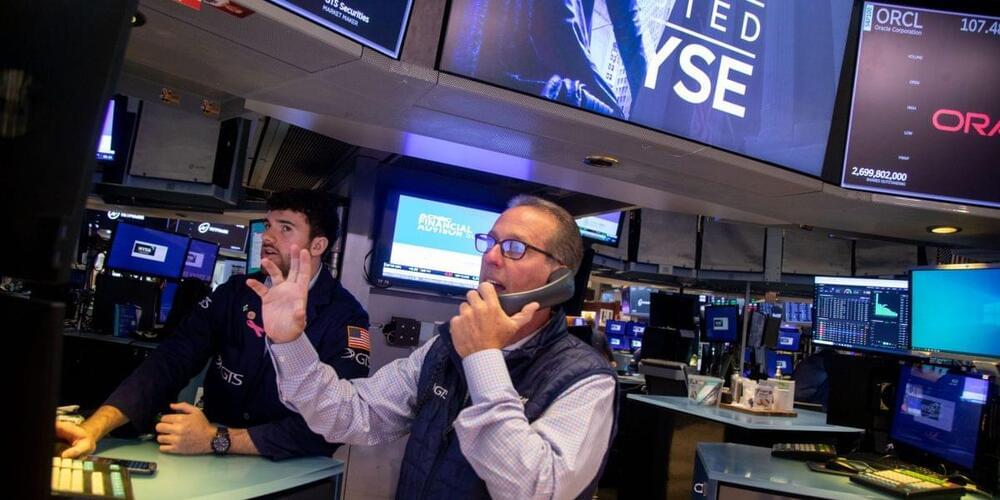If you start learning artificial intelligence skills now, you’ll be ahead of the curve when it becomes ubiquitous, says self-made millionaire Matt Higgins.




All of us are at the beginning of a journey to understand generative AI’s power, reach, and capabilities. This research is the latest in our efforts to assess the impact of this new era of AI. It suggests that generative AI is poised to transform roles and boost performance across functions such as sales and marketing, customer operations, and software development. In the process, it could unlock trillions of dollars in value across sectors from banking to life sciences. The following sections share our initial findings.
For the full version of this report, download the PDF.
Generative AI’s impact on productivity could add trillions of dollars in value to the global economy. Our latest research estimates that generative AI could add the equivalent of $2.6 trillion to $4.4 trillion annually across the 63 use cases we analyzed—by comparison, the United Kingdom’s entire GDP in 2021 was $3.1 trillion. This would increase the impact of all artificial intelligence by 15 to 40 percent. This estimate would roughly double if we include the impact of embedding generative AI into software that is currently used for other tasks beyond those use cases.

Generative AI’s potential to unleash creativity, accelerate discovery, and enhance efficiency could add trillions to Asian economies.
When it comes to the ability to generate, arrange, and analyze content, generative AI is a gamechanger—one with transformative social and economic potential.
As a technology that is democratized—one that doesn’t simply exist in a faraway lab or tech community in Silicon Valley, for instance—generative AI lowers the barriers to participation. In the age of generative AI, anyone can be a creator. But this also entails a profound workforce shift, changing the processes of production within the economy and, in turn, the types of tasks that are undertaken and the… More.
Developing The Low Earth Orbit Economy On The World’s First Commercial Space Station — David Zuniga, Senior Director, In-Space Solutions, Axiom Space
David Zuniga is Senior Director of In-Space Solutions at Axiom Space (https://www.axiomspace.com/), a space infrastructure developer headquartered in Houston, Texas, which plans human spaceflight for government-funded and commercial astronauts, engaging in in-space research, in-space manufacturing, and space exploration. The company aims to own and operate the world’s first commercial space station, and Mr. Zuniga helps to develop strategy and growth around Axiom’s Low Earth Orbit (LEO) economy, also playing a critical role in business and technical integration of Axiom’s in-space manufacturing and research capabilities for Axiom Station architecture.
Mr. Zuniga has over 20 years of experience through engineering and business development in human spaceflight and the department of defense, developing system architectures and technology for deep space systems via the Constellation, Orion, and Gateway programs. He was a Certified Principal Engineer for Orion’s Air Revitalization System, and subsystem manager for NASA’s Gateway program for the Environmental Control and Life Support Systems (ECLSS) where he developed requirements and certification criteria for future architectures.
Mr. Zuniga also has helped to evolve strategy around growth for LEO commercialization through the Center for the Advancement of Science in Space (CASIS) where he created a pipeline and managed a portfolio for aerospace technology development projects on the International Space Station National Laboratory (ISS NL). He has also served in numerous committees around human spaceflight safety and commercialization, has been an invited speaker to brief NASA HQ on strategy for the ISS NL, and was the recipient of the top prize at NASA’s Ignite the Night competition through NASA iTech when serving as the managing director for the Danish Aerospace Company’s North American Division.
Mr. Zuniga earned Bachelor and Master of Science degrees in Mechanical Engineering from Texas A&M University and holds a graduate certification in Space Resources from Colorado School of Mines where he studied space policy, economics, and space resource utilization.
Andreessen argues that thanks to A.I., “productivity growth throughout the economy will accelerate dramatically, driving economic growth, creation of new industries, creation of new jobs, and wage growth, and resulting in a new era of heightened material prosperity across the planet.”
This week, on the Lex Fridman Podcast, he offered advice to young people who want to stand out in what he describes in this “freeze-frame moment” with A.I.—where tools like ChatGPT and GPT-4 are suddenly available and “everybody is kind of staring at them wondering what to do.”
He noted that we’re now living in a world where vast amounts of information are at our fingertips and, with A.I. tools, “your ability both to learn and to produce” is dramatically higher than in the past. Such tools should allow for more “hyper-productive people” to emerge, he said. For example, there’s no reason authors and musicians couldn’t churn out far more books or songs than was customary in the past.

Ever since the release of OpenAI’s new chatbot ChatGPT in November, investors have been enamored with A.I. and its potential to revolutionize the world’s economy. Hopes for a future with increased productivity and lower costs as A.I. tools are rolled out to the masses have helped to lift markets in 2023 despite stubborn inflation, rising interest rates, and consistent recession predictions from economists. After dropping more than 30% in 2022, the tech-heavy Nasdaq Composite has recovered nearly all of its losses, gaining over 28% year to date, and the S&P 500 is now up more than 12%.
While some on Wall Street question whether stocks can continue their run of form in the second half of the year, pointing to stretched valuations in the Big Tech names and A.I. plays that have led the rebound so far, Wedbush’s top tech analyst Dan Ives argues it’s just the beginning of the “A.I. gold rush.”
“Many of the tech skeptics will point to today as a ‘1999 moment,’ à la on the verge of the dotcom bubble/collapse, given the significant move in tech valuations. We strongly disagree,” the veteran analyst wrote in a Monday research note. “While valuations in tech will be front and center, we continue to believe A.I. is driving the tech sector to a ‘1995 moment’ with a long runway of growth ahead that we have not seen since the 1990s.”
Using ChatGPT can put you on the path to becoming a millionaire, according to a YouTube video from personal finance expert Jaspreet Singh.

Cotton is the primary source of natural fiber on Earth, yet only four of 50 known species are suitable for textile production. Computer scientists at DePaul University applied a bioinformatics workflow to reconstruct one of the most complete genomes of a top cotton species, African domesticated Gossypium herbaceum cultivar Wagad. Experts say the results give scientists a more complete picture of how wild cotton was domesticated over time and may help to strengthen and protect the crop for farmers in the U.S., Africa and beyond.
The findings are published in the journal G3 Genes|Genomes|Genetics. Thiru Ramaraj, assistant professor of computer science in DePaul’s Jarvis College of Computing and Digital Media, is lead author on the publication. Leaps in technological advancement in the past decade made it possible for Ramaraj to analyze the genome in his Chicago lab.
“The power of this technology is it allows us to create high-quality genomes that supply a level of detail that simply wasn’t possible before,” says Ramaraj, who specializes in bioinformatics. “This opens up the possibility for more researchers to sequence many crops that are important to the global economy and to feeding the population.”
Subscribe here: http://9Soci.al/chmP50wA97J Full Episodes: https://9now.app.link/uNP4qBkmN6
Watch the full interview here: https://youtu.be/gho0PlDU_TI
Filmmaker James Cameron has visited the Titanic wreck more than 30 times, and this sparked his love for deep ocean exploration. In this 2018 #60Mins interview, he said with most voyages to the ocean floor, the risk is high and rescue is difficult.
WATCH more of 60 Minutes Australia: https://www.60minutes.com.au.
LIKE 60 Minutes Australia on Facebook: https://www.facebook.com/60Minutes9
FOLLOW 60 Minutes Australia on Twitter: https://twitter.com/60Mins.
FOLLOW 60 Minutes Australia on Instagram: https://www.instagram.com/60minutes9
For over forty years, 60 Minutes have been telling Australians the world’s greatest stories. Tales that changed history, our nation and our lives. Reporters Liz Hayes, Tom Steinfort, Tara Brown, Nick McKenzie and Amelia Adams look past the headlines because there is always a bigger picture. Sundays are for 60 Minutes.
#60MinutesAustralia